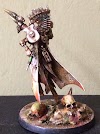 (Cover from November 1970.)
(Cover from November 1970.)"Day Of Thunder.. Night Of Death!"
Written by Roy Thomas.
Drawn by Herb Trimpe.
Inked by John Severin.
Lettering by Sam Rosen.
Sometimes in life, things can get on top of us. People try to blow us up. People try to kidnap us. People try to disintegrate us.
And when they do, what better solution than to climb inside a crate and have ourselves shipped to the Mediterranean?
Sadly, that's as good as things get for the Hulk as his improvised method of globe-trotting takes him to that well known land of Morvania, famous for being ruled by the evil tyrant Draxon, a man who gives new definition to the phrase, "an iron fist in an iron glove." Upon encountering the Hulk, the dictator tries to enlist the monster's services in his plans to rule the world and when the Hulk says he's not interested in ruling the world - giving a very Lennonesque speech about seeing no boundaries or countries when he's leaping through the air - the tyrant tries to kill him. Needless to say this attempt fails miserably and, after threatening to squish Draxon like a prune if he doesn't leave him alone, the Hulk bounds off to hang around in the peace and solitude of the mountains.
But, in the village below, the forces of rebellion are a-stirring...
This is another of my favourite Hulk tales of the era which, as in issue #112 sees the Hulk cast in the role of liberator of the oppressed. It's a role he suits well, given his combination of power and innocence, which could explain why it's one that keeps recurring in his life. Foes completely deluded by hubris also work well, so, to some degree it's the perfect set-up for a Hulk tale and one that'll more than pay dividends in the next issue.
But the most impressive thing about the tale is its opening section in which Thunderbolt Ross risks his life to confront the Hulk alone and ask the monster to hand over the seriously injured Jim Wilson so he can be flown away for medical treatment. It's a nicely drawn sequence by Trimpe that leaves you in no doubt as to the General's physical vulnerability in such a situation and therefore the courage and the not-always-previously-glimpsed humanity he's showing just by being there. The general even makes something of a conceptual breakthrough as he tries to befriend the Hulk - only to have his attempt destroyed by the nervousness of his trigger happy pilots.
The irony is somewhat lost on him that it's the air of paranoia about the Hulk he's created among his men that's made them trigger-happy in the first place but still there are parallels with the development of J Jonah Jameson in the Spider-Man comics in that both Ross and Jameson started out as one-dimensional ranters, hating the strip's protagonist for no good reason other than to generate drama, who, as time went along, started to show more admirable traits. The difference being that Jameson was never allowed to develop beyond a certain point and would always revert to his default position after brief periods of being admirable, whereas Ross continued his development as the strip went along.






0 Yorumlar